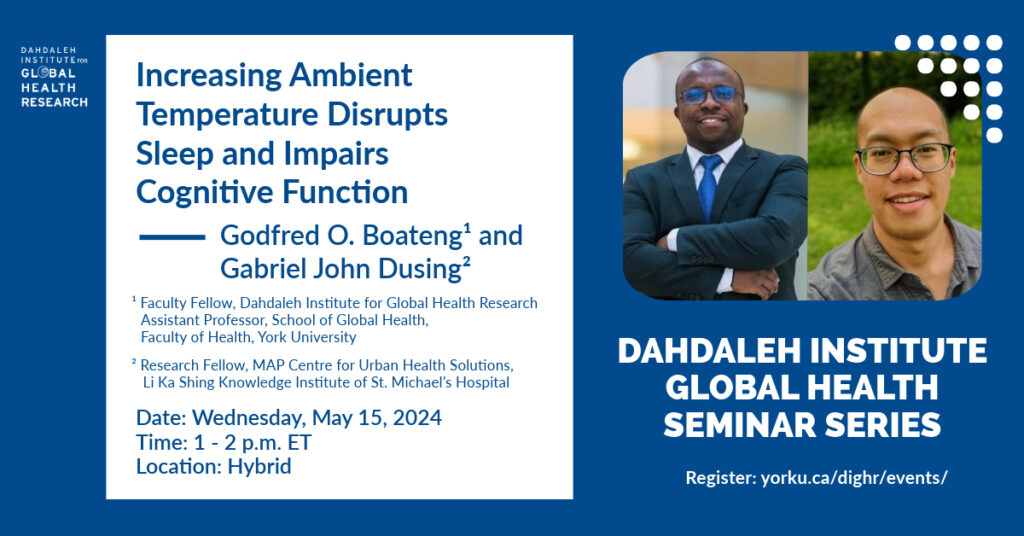Increasing Ambient Temperature Disrupts Sleep and Impairs Cognitive Function, with Godfred Boateng and Gabriel John Dusing
Cognitive decline and sleep disorders are prevalent in sub-Saharan Africa, but the role of extreme heat in these conditions remains poorly understood. In this seminar, Professor Godfred Boateng and Dr. Gabriel John Dusing will discuss their latest research findings analyzing extreme heat events which are increasing in frequency and intensity, and impacting the health of older adults. Their study explored the relationship between temperature, sleep quality, and cognitive function in Ghanaian adults over the age of 50, particularly women.
Using structural equation models and accounting for data clustering, they examined the direct and indirect relations between increasing average temperatures in the past, sleep difficulties, and cognitive impairment, while adjusting for appropriate covariates. They created a novel dataset by combining data from the WHO Ghana Study on Global Ageing and Adult Health (2014/2015) with temperature measurements derived from the Climatic Research Unit (University of East Anglia) gridded Time Series (CRU TS v.4.07). The speakers will then recommend the acceleration of climate mitigation and adaptation practices that aims to reduce the effects of global warming for Low- and Middle-Income Countries. Join us for this talk addressing global health inequities for socially disadvantaged populations, particularly those in sub-Saharan Africa, amidst a rapidly changing environment.

Speaker Profile
Godfred Boateng
Dr. Godfred Boateng is an Assistant Professor at the School of Global Health, Director of the Global and Environmental Health Lab, a Canada Research Chair in Global Health and Humanitarianism, and a faculty fellow at the Dahdaleh Institute for Global Health Research at York University. Dr. Boateng is an expert in the design and application of culturally relevant scalable methodologies to study the multidimensional factors and processes that shape health and health equity across spatial scales (household, community, institutional, national), and how they can be promoted and sustained. His research program is transdisciplinary and focuses on resource insecurity, health, and sustainable livelihoods; the socio-ecological determinants of cardiometabolic conditions in aging adults; social inequity in health systems; quantitative data analysis methods and survey scale development; and COVID-19-related health effects. Dr. Boateng’s research in these areas has been critical in transforming the understanding of the key social and structural determinants of health among vulnerable populations, including women, infants, children, and older adults.
Dr. Boateng’s research is supported through both internal and external funding sources from the Social Sciences and Humanities Research Council; Canadian Institutes of Health Research; Canadian Foundation for Innovation; International Development Research Centre; Eunice Kennedy Shriver National Institute of Child Health and Human Development; National Institute on Minority Health and Health Disparities; United States Health Resources & Service Administration; the National Institute of Transportation and Communities; and the Dahdaleh Institute for Global Health Research.
Gabriel John Dusing
Dr. Dusing’s research utilizes linked longitudinal health administrative data and employs techniques such as survival analysis and difference-in-differences to examine complex social and health issues. He holds a PhD in mathematics from the University of Tennessee. His publications in journals such as, Psychological Medicine, Social Science & Medicine, PLoS One, and the American Journal of Psychiatry, highlight his expertise in addressing critical topics such as mental health, population health, and the social determinants of health.
Register below and join us on Wednesday, May 15, at 1 p.m.
RSVP
Registrations for this event has closed.

